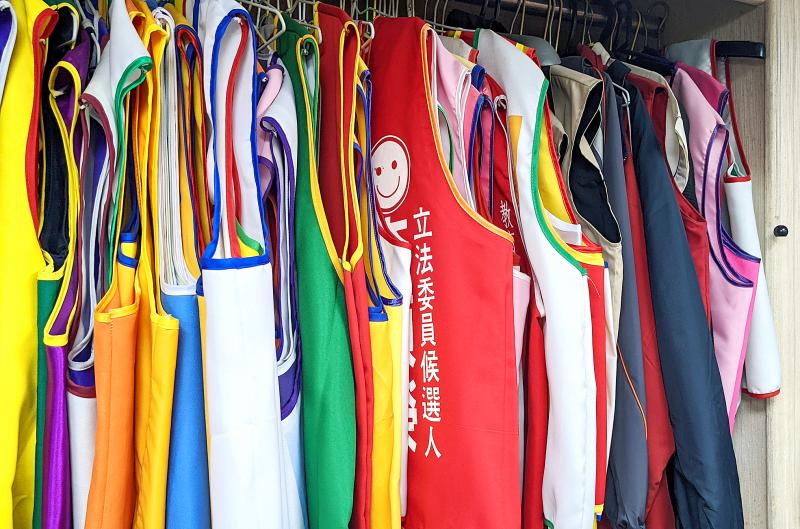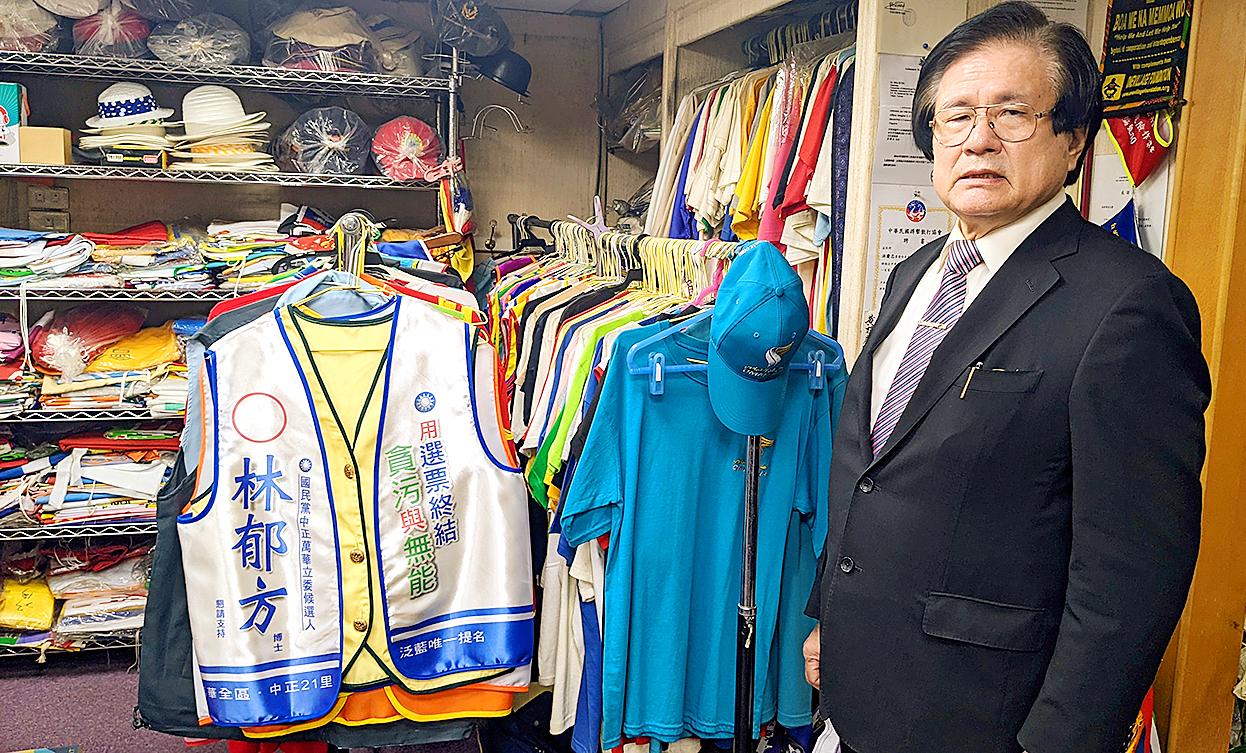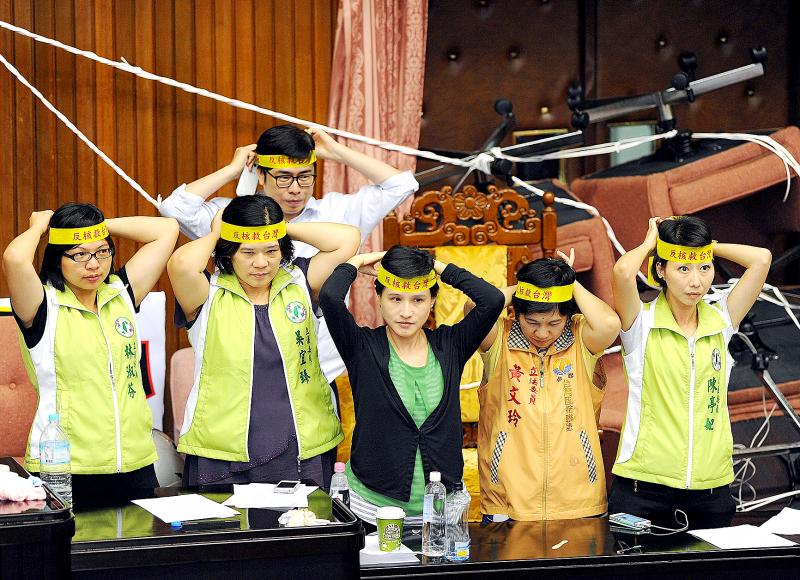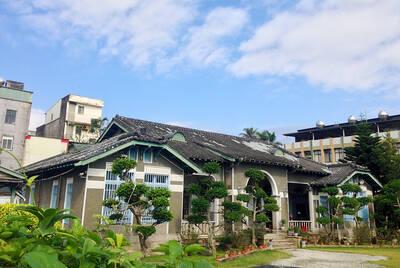Huang Li-yu (黃麗伃) doesn’t think it’s possible to campaign for public office without a vest.
Those who have experienced Taiwan’s fervent, colorful election seasons will know what she’s talking about: the brightly-colored, polyester “uniforms” emblazoned with the candidates’ name, number, party and perhaps a slogan or two.
“In the current political climate, these vests are a must,” says Huang, the borough warden of Yongan Borough in New Taipei City’s Sanchong District (三重). “When you’re campaigning, you’re trying to be seen by those who don’t know you. If you don’t wear them, nobody would even know that you’re campaigning.”

Photo: Han Cheung, Taipei Times
Taiwanese voters pay attention to the size and fighting spirit of a candidate’s campaign team, Huang says, which can be accentuated with all members wearing identical vests.
However, there’s little information on how these vests became a uniquely Taiwanese election phenomenon. One of the few online sources is a 2019 video by YouTuber-turned-Taipei City Councilor Chiu Wei-chieh (邱威傑), better known as Froggy (呱吉).
Chiu doesn’t hide his distaste for these garments in the video, and he customized his own when he ran for office in 2018.

Photo: Han Cheung, Taipei Times
“Elections are similar to beauty pageants; the candidates present themselves on stage in hopes of being chosen. But the difference here is that pageant contestants are dressed beautifully, while election candidates wear these hideous vests,” he says. “If you look at the US, Japan and other countries, none of them have this culture of wearing campaign vests.”
VESTED INTERESTS
Mike Hung (洪慶忠) has been to 138 countries and met more than 50 presidents. His expandable business card lists him as the Chairman of the Taiwan Africa Industry Development Association, Honorable Chairman of the Taiwan Pro-Wrestling Foundation, Chairman of International Affairs at the National Association of Small & Medium Enterprise and Executive Supervisor of the Taiwan Health Movement Alliance.

Photo: Fang Pin-chao, Taipei Times
But his main hustle is running Mike Hung Products Co (嘜德有限公司), which has created all sorts of promotional accessories — especially vests — for politicians, temples, charities, volunteer groups and other occasions for more than four decades. His office is like a museum, with countless samples, artifacts and walls plastered with photos of him posing with notable figures.
While candidates have been seen wearing vests in local elections since at least the 1970s, Hung says the practice took off with the first direct presidential elections in 1996.
Lee Tsung-hsing (李宗興), owner of Li Daji Gifts (李大吉禮品) in Taipei, says he started seeing more campaigners wear these vests in the 1980s with the rise of the Dangwai (黨外) opposition movement and the end of the Chinese Nationalist Party’s (KMT) one-party rule. He adds that they became popular in temples and volunteer organizations around the same time.

Photo: CNA
“There was a whole crop of new politicians who needed to get their name out,” Lee says. “Before, it was mostly the same old folks running. The vests proved to be effective advertising, and eventually they became election necessities.”
Practicality was the appeal at first. The vests are cheap, waterproof, can be made in a day and come in one size. They’re also easy to put on and take off according to campaign needs.
Some candidates bought them by the tens of thousands, Hung says, recalling Hsieh Shen-shan’s (謝深山) order when he ran for Taipei County Magistrate in 1997. Former president Chen Shui-bian (陳水扁) was one of the first to print slogans on the vests during his presidential bid in 2000, Hung adds.

Photo: Huang Mei-chu, Taipei Times
Those were the golden years, Lee says. Not only were there an unprecedented number of high-profile elections, there was also a proliferation of new political parties. It was common to see up to nine candidates running for one legislative seat, and each one wanted vests.
Hung says that these vests became a hit in Taiwan because they give off an image of approachability, making candidates more relatable to voters.
“That’s very important in Taiwanese elections,” he says. “You just can’t go into communities and campaign in a suit.”
NEW LOOK
These days, more fashion-conscious candidates are eschewing the traditional stock vests, preferring to custom-make their own. When Chiu ran for office in 2018, his team spent a lot of time looking for a company that could offer alternative cuts and better materials. They ended up with a slick all-black vest with pink embroidered text for the campaign team.
“Although good design doesn’t indicate a good candidate or good party, candidates should pay attention to campaign aesthetics as part of the battle. As Taiwan’s election system matures, people will increasingly care about the quality and style of presentation,” Chiu says.
At first, there wasn’t much of a unified style for vests or other campaign apparel, even within the same parties. But in the past two decades or so, another type of vest has emerged — a more proper looking, higher-end one that the candidate can wear to all sorts of occasions.
Both Hung and Lee’s companies have seen an increase in demand for these vests as parties strive for a more unified look in public.
Yang Chia-wei (楊家緯) writes in the study, Yundong: Dress of Male Politicians during Election Campaigns in Taiwan (運動:臺灣選舉活動中男性政治人物的穿著) that these are often dubbed “battle robes.” Party members are required to wear them during large events or showdowns over contentious issues in the Legislative Yuan, where violent conflicts may erupt and it’s important for the combatants — and the media — to know who is who.
Overall, Hung says sales for the election vests have been dropping as candidates focus more on online campaigning instead of canvassing the streets. The government has also tightened regulations on campaign funding, and growing environmental restrictions and concerns have also cut into the demand for disposable promotional material.
Will this trend ever catch on in other countries? Hung says it has to a certain degree — many African or Central American nations that he works with have emulated Taiwan in displaying large numbers of election hats, shirts, flags, banners and so on.
He shows me hats that he has made for politicians in the Democratic Republic of Congo, Burkina Faso and Chad. However, the vests have yet to catch on.
“They can’t get used to it,” he says. “So it remains a unique Taiwanese phenomenon.”

From the last quarter of 2001, research shows that real housing prices nearly tripled (before a 2012 law to enforce housing price registration, researchers tracked a few large real estate firms to estimate housing price behavior). Incomes have not kept pace, though this has not yet led to defaults. Instead, an increasing chunk of household income goes to mortgage payments. This suggests that even if incomes grow, the mortgage squeeze will still make voters feel like their paychecks won’t stretch to cover expenses. The housing price rises in the last two decades are now driving higher rents. The rental market

July 21 to July 27 If the “Taiwan Independence Association” (TIA) incident had happened four years earlier, it probably wouldn’t have caused much of an uproar. But the arrest of four young suspected independence activists in the early hours of May 9, 1991, sparked outrage, with many denouncing it as a return to the White Terror — a time when anyone could be detained for suspected seditious activity. Not only had martial law been lifted in 1987, just days earlier on May 1, the government had abolished the Temporary Provisions Effective During the Period of National Mobilization for Suppression of the Communist

When life gives you trees, make paper. That was one of the first thoughts to cross my mind as I explored what’s now called Chung Hsing Cultural and Creative Park (中興文化創意園區, CHCCP) in Yilan County’s Wujie Township (五結). Northeast Taiwan boasts an abundance of forest resources. Yilan County is home to both Taipingshan National Forest Recreation Area (太平山國家森林遊樂區) — by far the largest reserve of its kind in the country — and Makauy Ecological Park (馬告生態園區, see “Towering trees and a tranquil lake” in the May 13, 2022 edition of this newspaper). So it was inevitable that industrial-scale paper making would

Hualien lawmaker Fu Kun-chi (傅?萁) is the prime target of the recall campaigns. They want to bring him and everything he represents crashing down. This is an existential test for Fu and a critical symbolic test for the campaigners. It is also a crucial test for both the Chinese Nationalist Party (KMT) and a personal one for party Chairman Eric Chu (朱立倫). Why is Fu such a lightning rod? LOCAL LORD At the dawn of the 2020s, Fu, running as an independent candidate, beat incumbent Democratic Progressive Party (DPP) lawmaker Hsiao Bi-khim (蕭美琴) and a KMT candidate to return to the legislature representing